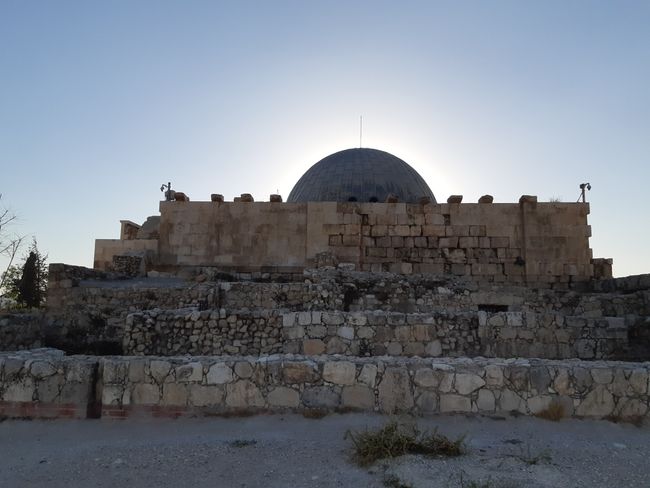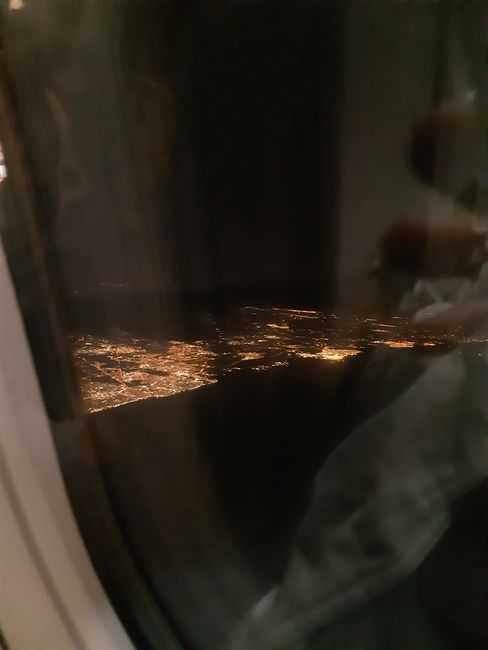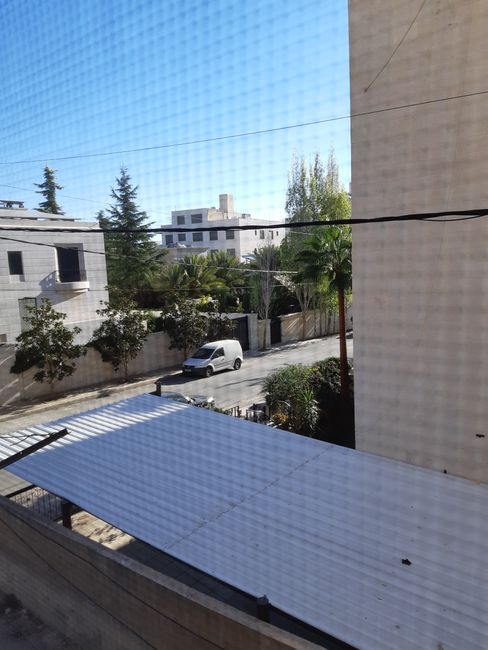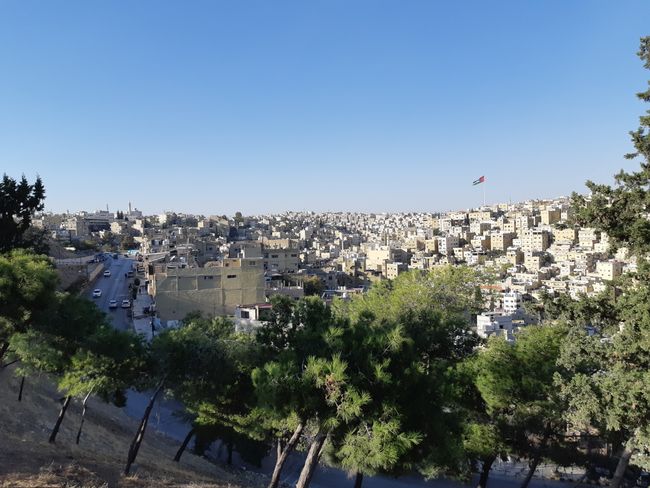Week 1: 'War on Peace' and the first impression
Birt: 04.11.2018
Gerast áskrifandi að fréttabréfi
The first book may seem surprising, it is 'War on Peace' by Ronan Farrow from this year (German title: 'Das Ende der Diplomatie'). But it begins in Amman. Near the US Embassy. My time that I want to report on also begins in Amman. Near the US Embassy.
Ronan Farrow describes the area where I will be living for the next few weeks as 'posh' (2018, p. 12). With this image in mind, I have now arrived in Amman. However, I landed in the evening around 8:00 PM local time, when it is already dark at this time of year. Places have their own magic in the darkness, but the lack of light distorts the first impression you get of them.
I will always remember a visit to a friend near Halle (greetings to Maria at this point), which took place at a similar time of day. She picked us up from the train station in the evening, and we drove through the dark landscape. It was illuminated every second by flashing red dots. It felt like an alien invasion, as depicted in movies. The next morning, the sobering realization: we had driven through a landscape with countless wind turbines. The surroundings were much more sober and less exciting - and therefore lost some of their magic.
Back to a distant place. When we flew over Israel, I was amazed at how brightly lit it was - it seemed unbelievably densely populated, as every square centimeter appeared to be illuminated. I cannot say for sure if that is really the case, maybe we just flew directly over Tel Aviv, the display in the plane was unfortunately not very precise.
Amman also could not create a special first impression for me. During the taxi ride from the airport, everything looked to me like a typical southern city. If I had been blindfolded and put on a plane and my blindfold had only been removed in the taxi, I would have recognized that I was in an Arabic-speaking country and not in Spain, for example, based only on the prevailing signs (although my knowledge of Spain at night is also rather superficial). What caught my attention were the many run-down trucks and vans - while the cars did not look much different from what I am familiar with. I am curious to see how this first impression will be revised in the coming weeks.
I was able to understand the description of my future neighborhood as 'posh' during an initial drive: the closer we got to the apartment according to the Google Maps display on the taxi driver's phone, the more elegant and well-maintained the houses became.
Now, seen in daylight, I can confirm that. Abdoun, that is the neighborhood's name, is dotted with embassies, which is why many diplomats live here. Saddam's daughter is also said to have a house around the corner. There are many beautiful houses here, modern and with interesting designs, partly with glass elements or plants, but they all have the same color: if one were malevolent, one could call it 'greige', the standard color of the German tourist abroad: a light brownish-gray shade (the word 'greige' is a combination of 'gray' and 'beige'). But it is more appropriate to describe the houses generously: they have rather the color of desert sand. A color that does not fade even in strong sunlight and cannot be washed out by rain. A color that forms a good contrast to jasmine flowers growing over a wall.
The closer you get to downtown, the more the houses become similar in shape: desert-colored boxes with a regular number of windows. That is what sets Abdoun apart: at least by their form, you can distinguish the houses from each other and their owners can show their individuality.
So much for my first impression of Amman, back to the book: I still have comparatively plenty of time to read, as my internet, which is not yet working, keeps me mostly tied to the house (and the fact that school has not started for me yet). I actually have a good sense of direction and no problem moving around in unfamiliar cities, but not being able to ask for help in an emergency unsettles me: I cannot ask my phone because I have no internet, and I cannot rely on asking someone on the street because my knowledge of Arabic is less than rudimentary and one cannot be 100% sure that the person speaks English (although that has been the case in most situations so far). But I will probably talk about language again.
So I still spend a lot of time in the apartment and read. By the way, on an e-book reader, because I already had excess baggage on the flight there without having to carry half of my bookshelf, as I would have liked. So far, Farrow's book is quite recommendable; it presents an overview of American diplomatic history, the author has talked to an incredible number of people, can draw on rich personal experience, and provides interesting insights and findings: for example, he applies the English phrase 'If you break it, you own it.' to the way the US dealt with Iraq (see 2018, p. 49), sees the decline of diplomacy also rooted in the increasing spread of technology (why do you need a messenger when you can send an email? ibd., p. 37 f.), and makes interesting parallels to Orwell's '1984' when he explains how quickly diplomatic relations can turn by 180 degrees (ibd., p. 157) - and I am only on p. 163 out of 1179. So here too, just the presentation of a first impression.
Whether this book will continue in the next blog post remains to be seen; in any case, I still have a lot to read.
Gerast áskrifandi að fréttabréfi
Svaraðu (1)
Rebekka
Ich bin die Erste, die kommentiert!!!! Und ganz aufgeregt, auch mal einem Blog folgen zu können. Schreib fleißig und bebildere schön! Mich freut es auf jeden Fall :)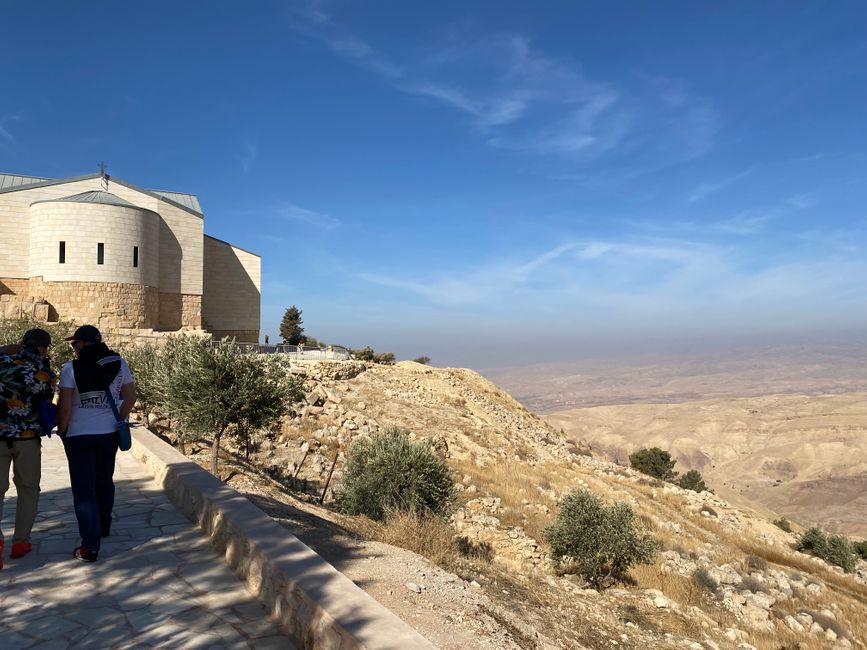
Ferðaskýrslur Jórdaníu

